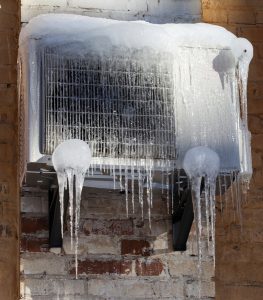 “Wait, isn’t ice development a normal part of air conditioning? After all, it is a cooling system right?”
“Wait, isn’t ice development a normal part of air conditioning? After all, it is a cooling system right?”
Well, not quite. Actually, ice is not part of the cooling process at all! Unless you’re using an evaporative cooler—which is likely not the case here in Northwest Florida—then you’re using a refrigerant-based system to cool your home. To provide the cooling you feel in your living space, your air conditioner uses that chemical refrigerant to absorb heat from inside your home and transfer outdoors. This is why the condenser unit outside blows out heated air when your air conditioner is running.
Moving heat from one place to another using refrigerant, as we just described, does not use or create ice.
That’s Right, Ice Development Isn’t Normal
Sure, it might happen, but it shouldn’t. The reason it sometimes occurs is due to a reduction in how well the cold refrigerant moving through your AC coil and fins removes heat from the air. If the refrigerant doesn’t warm up from heat transferred from the air blowing across it, it remains below-freezing.
As water vapor condenses and collects on the coil—which is a normal part of the cooling process—the cold refrigerant freezes it. The presence of this ice further impacts how well the refrigerant is able to absorb heat, which means more ice. Ice will continue to develop at this point until your air conditioner can’t remove any heat from the air, meaning it will stop working as a cooling system. This ice can also warp and damage the evaporator coil.
The Reason for Ice Development
So, what actually causes ice to develop on an air conditioner, since this isn’t a normal part of the cooling process? There are a number of possible answers to this:
- Dirt and Grime Development: Any debris like dirt over the coil creates an insulating layer against proper heat absorption, which causes ice to form. This is one of the reasons we always stress the importance of annual air conditioning maintenance. If our technicians find that the coils are dirty, we’ll clean them off.
- Clogged Air Filter: Fortunately, this is something you can prevent on your own, by regularly changing your air filter. The HVAC air filter should be changed every 1-3 months, depending on the type of filter and the level of contaminants in the home. For instance, a home with excessive pet dander or cigarette smoke may need the filter changed more than a home without.
- Leaking Refrigerant: This is the biggest problem that can cause a frozen evaporator coil. If refrigerant escapes through leaks, there won’t be enough refrigerant left in the coil to draw sufficient heat in order to warm the remaining refrigerant. The smaller amount of refrigerant will be too cold and cause ice to develop. Unfortunately, there are fairly common misconceptions that refrigerant is fuel, and runs out like gasoline does from a car. This is not the case—if you’re losing refrigerant you have a leak.
For expert air conditioning repair in Fort Walton Beach, FL, contact Kool Breeze of Northwest Florida.
